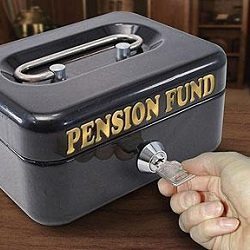The Scary Thing You Might Be Forgetting With Your Investments
Investing is not an area where we normally give much thought to identity theft. And yet it’s for this exact reason we need to pay more attention. If you’re not taking necessary precautions, identity theft can cause havoc on your finances and investments. Do you want to lose years of hard work and building wealth in one fail swoop?
Identity theft is most likely to occur when your guard is down.
So why is it important to protect your investments from identity theft? And how can you avoid this disaster in the future?
How Identity Theft Affects Your Investments
The risks of identity theft are similar with investments as they are with banking, credit cards, and filing income taxes. But investments have one additional risk: accounts holding large balances have the potential for big losses.
Consider the ways identity theft could impact your investments:
Someone gaining access to your accounts. This is precisely how a thief could clean out your investment account. For the most part, all they need is your name, current address, and Social Security number. Then they’re on their way to becoming you, for all intents and purposes. A single successful breach into your account is all it takes to clean it out for good.
Advertisement
To make matters worse, as a rule, there’s no type of insurance to cover your losses in this case.
Someone stealing your identity from your accounts. A thief can also use your account information to get your identity. He may or may not be interested in draining the account, but he will certainly want the information that can enable him to pose as you in other more profitable situations. This could include gaining access to multiple accounts to drain.
Using your identity to obtain credit. Sometimes, a thief is not interested in your assets. The real prize is capturing your identity for the purpose of obtaining credit. It is conceivable a thief could secure hundreds of thousands of dollars in loans using your identity, particularly if you have a strong credit profile. The thief can take the money from the loans, sticking you with the liability.
Using your identity for employment. The rise in immigration has created a cottage industry involving the theft and reassignment of identity to undocumented workers for employment purposes. This is perhaps the most benign purpose of identity theft, but it will still cause obvious problems nonetheless.
Using your identity to commit fraud. A thief can steal your identity for the express purpose of using your profile to commit fraud. Applying for credit is one example, but there are many more. One of the fastest-growing types of fraud right now is income tax fraud. The thief uses your identity to file bogus tax returns that enable him to receive a very large income tax refund. The thief gets the refund, leaving you to clean up the mess.
How to Protect Your Investments From Identity Theft
Fortunately, there are ways to protect your investments from identity theft, mostly by adopting good habits and spending only a little bit of money.
Never give out personal information. This is just a good habit to get into. The less information you give in fewer places, the less likely theft will occur. This is especially true of your Social Security number. Anyone you do business with already has it on file and shouldn‘t need you to provide it.
Do business only with encrypted websites. Never get too casual in conducting business online. Be sure any information you enter — especially financial information — is done on encrypted pages only. You’ll know a page is encrypted when https (not simply http) is included in the URL. The “S” confirms encryption.
Have anti-virus and anti-spyware software (and keep it updated). This is a given and you probably already have both. Just make sure you keep them up-to-date and active. Also make sure any software you use is recommended by people you trust. Never trust free versions of antivirus or anti-spyware software. At best they will be effective at low levels, at worst they may carry viruses and spyware with them.

Don’t visit suspicious websites or open questionable emails. A good antivirus software will let you know if a website is safe. If you ever have any doubts, stay away. As for emails, same advice –- if it looks suspicious, delete it. If you open it, don’t click on any links it contains. Clicking a link is an invitation for malicious transmissions.
Keep permanent documents under lock and key. You should keep the number of permanent documents to a minimum, but when you have to have them, make sure that they’re stored under lock and key. Identity theft is often an inside job — the thief could be a person you know or a casual visitor.
Shred unnecessary paper documents. A shredder is required equipment these days. Any unnecessary papers you have should be shredded. Never trust them to the trash pail. Better yet, conduct all important business online, and avoid dangerous paper trails.
Be careful on social media and online. Social media is yet another place where we get too casual. Resist the temptation to share personal information about your finances –- it could give a would-be thief incentive. The same is true if you have a website. Many bloggers are fond of listing their assets on their websites, but you may as well be painting a target on your website, as well as your identity, by doing so.
Even when it comes to investments, the potential for identity theft can never be ignored. But it’s easier to contain than it seems.
Just investing in some decent software and modifying a few habits can increase your protection level exponentially.
How do you protect your investments from identity theft and fraud?
Leave a comment